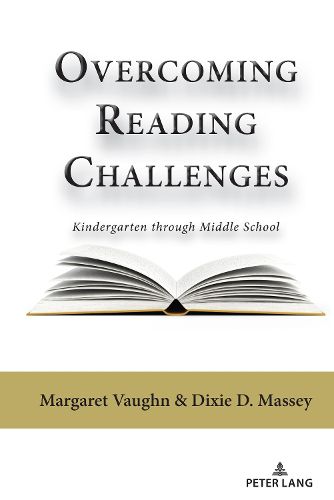Readings Newsletter
Become a Readings Member to make your shopping experience even easier.
Sign in or sign up for free!
You’re not far away from qualifying for FREE standard shipping within Australia
You’ve qualified for FREE standard shipping within Australia
The cart is loading…






This title is printed to order. This book may have been self-published. If so, we cannot guarantee the quality of the content. In the main most books will have gone through the editing process however some may not. We therefore suggest that you be aware of this before ordering this book. If in doubt check either the author or publisher’s details as we are unable to accept any returns unless they are faulty. Please contact us if you have any questions.
Given the current emphasis on how to teach reading, also known as the debate on the "Science of Reading," this text addresses the fundamentals of reading instruction and provides practical evidence-based research and strategies to support students who may be experiencing reading challenges. With a keen focus on how to apply knowledge of effective teaching along with reading strategies, this text addresses the flexibility teachers must know in order to teach reading to a wide variety of learners. Drs. Margaret Vaughn and Dixie Massey focus on critical questions about reading instruction ranging from, "When should a child be reading?" to "How do you strengthen decoding and fluency in students?" to "What to do when a student starts middle school?" The book opens with critical questions like these and outlines each chapter with knowledge of theory and practical instructional actions teachers of all levels can engage in to support students experiencing reading challenges. As former classroom teachers and now literacy researchers and professors, the chapters reflect their combined knowledge of over 20 years along with current research and practical strategies for teachers of all levels.
Every chapter opens with guiding questions, followed by theories and recommended instructional practices to support effective and equitable reading instruction for a wide variety of learners. Key areas addressed include:
Phonemic awareness
Decoding
Fluency
Reading Comprehension
Vocabulary
In addition, there are chapters that focus on often overlooked areas of reading instruction such as motivation and student agency, critical to support and engage readers in today's educational settings. This practical guide highlights how to support students experiencing reading challenges as well as how to engage and partner with families to support students.
$9.00 standard shipping within Australia
FREE standard shipping within Australia for orders over $100.00
Express & International shipping calculated at checkout
This title is printed to order. This book may have been self-published. If so, we cannot guarantee the quality of the content. In the main most books will have gone through the editing process however some may not. We therefore suggest that you be aware of this before ordering this book. If in doubt check either the author or publisher’s details as we are unable to accept any returns unless they are faulty. Please contact us if you have any questions.
Given the current emphasis on how to teach reading, also known as the debate on the "Science of Reading," this text addresses the fundamentals of reading instruction and provides practical evidence-based research and strategies to support students who may be experiencing reading challenges. With a keen focus on how to apply knowledge of effective teaching along with reading strategies, this text addresses the flexibility teachers must know in order to teach reading to a wide variety of learners. Drs. Margaret Vaughn and Dixie Massey focus on critical questions about reading instruction ranging from, "When should a child be reading?" to "How do you strengthen decoding and fluency in students?" to "What to do when a student starts middle school?" The book opens with critical questions like these and outlines each chapter with knowledge of theory and practical instructional actions teachers of all levels can engage in to support students experiencing reading challenges. As former classroom teachers and now literacy researchers and professors, the chapters reflect their combined knowledge of over 20 years along with current research and practical strategies for teachers of all levels.
Every chapter opens with guiding questions, followed by theories and recommended instructional practices to support effective and equitable reading instruction for a wide variety of learners. Key areas addressed include:
Phonemic awareness
Decoding
Fluency
Reading Comprehension
Vocabulary
In addition, there are chapters that focus on often overlooked areas of reading instruction such as motivation and student agency, critical to support and engage readers in today's educational settings. This practical guide highlights how to support students experiencing reading challenges as well as how to engage and partner with families to support students.